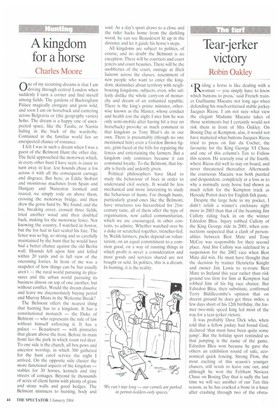A kingdom for a horse
Charles Moore
One of my recurring dreams is that I am driving through central London when suddenly I turn a corner and find myself among fields. The gardens of Buckingham Palace magically elongate and grow wild, and soon I am on horseback and cantering across Belgravia or (the geography varies) Soho. The dream is a happy one of unexpected space. like the Tardis, or Narnia hiding in the back of the wardrobe. Contained in the familiar world lies an unexpected chance of romance.
I felt I was in such a dream when I was a guest of the Belmont Hunt the other day. The field approached the motorway which, in every other hunt I have seen, is cause to turn away in fear, lest hounds chase a fox across it with all the consequent carnage and disgrace. But here, as Eddie Stobart and monstrous machines from Spain and Hungary and Nuneaton loomed and roared, we simply rode on above them, crossing the motorway bridge, and then drew the gorse hard by. We found, and the fox, breaking cover, crossed three fields, tried another wood and then doubled back, making for the motorway fence. Not knowing the country, I watched in horror, but the fox had in fact sealed his fate. The fence was so big, so strong and so carefully maintained by the hunt that he would have had a better chance against the old Berlin wall. Hounds fell upon him and killed within 20 yards and in full view of the oncoming lorries. In front of me was a snapshot of how things can be but usually aren't — the rural world pursuing its pleasures and the urban world pursuing its business almost on top of one another, but without conflict. Would the dream dissolve and leave me disconsolately buying petrol and Murray Mints in the Welcome Break?
The Belmont offers the nearest thing that hunting has to a kingdom. It has a constitutional monarch — the Duke of Belmont — who represents the rule of law without himself enforcing it. It has a palace — Beaudesert — with pinnacles that gleam above the frost. Before its main front lies the park in which roam red deer. To one side is the church, all box pews and ancestor worship, in which 300 gathered for the hunt carol service the night I arrived. On the opposite side cluster the more functional aspects of the kingdom — stables for 30 horses, kennels and tiny streets of cottages. Beyond lie thousands of acres of client farms with plenty of grass and stone walls and good hedges. The Belmont ministers to hunting, body and soul. As a day's sport draws to a close and the rider hacks home from the darkling wood, he can see Beaudesert lit up in the distance and let it guide his horse's steps.
All kingdoms are subject to politics, of course, and no doubt the Belmont is no exception. There will be courtiers and court jesters and court beauties. There will be the snobberies of the court, outrage at illicit liaisons across the classes, resentment of new people who want to enter the kingdom, skirmishes about territory with neighbouring kingdoms, subjects, even, who sullenly dislike the whole carry-on of monarchy and dream of an unhunted republic. There is the king's prime minister, otherwise known as the Master, whose conduct and health (on the night I met him he was only semi-mobile after having hit a tree on horseback) provoke as much comment in that kingdom as Tony Blair's do in our own. There is presumably (though no one mentioned him) even a Gordon Brown figure, grim-faced at the bills for repairing the fences and entertaining the farmers. But a kingdom only continues because it can command loyalty. To the Belmont, that loyalty is freely and ardently given.
Political philosophers have liked to study the behaviour of bees in order to understand civil society. It would be less mechanical and more interesting to study the behaviour of hunts. For though hunts, particularly grand ones like the Belmont, have structures too hierarchical for 21stcentury taste, all of them offer the type of organisation, now called communitarian, which we are encouraged, in other contexts, to admire. Whether watched over by a duke or scratched together, trencher-fed, by Welsh farmers, packs depend on voluntarism, on an equal commitment to a common good, on a way of running things in which profit is never a consideration and most goods and services shared are not bought or sold. In politics, this is a dream. In hunting, it is the reality.


























































 Previous page
Previous page